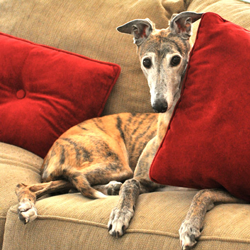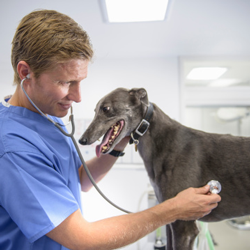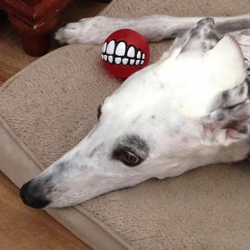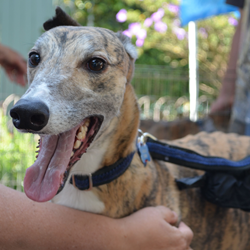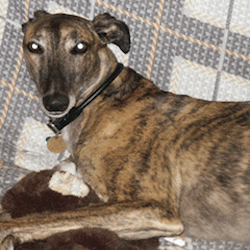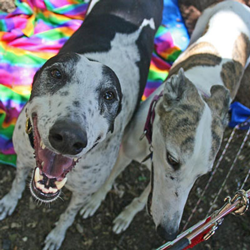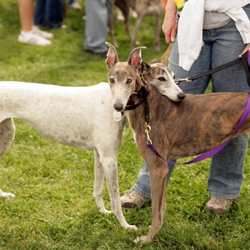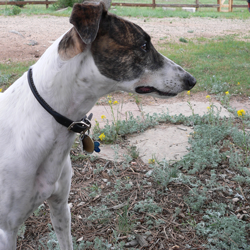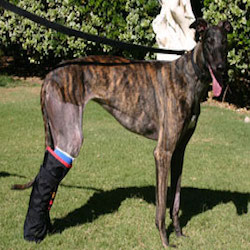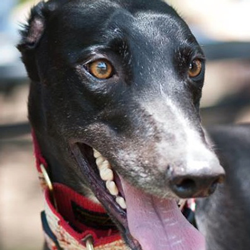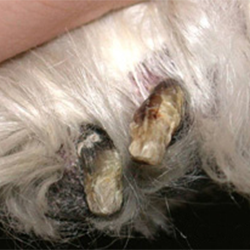HEALTH-GREYHOUNDS ARE DIFFERENT: Digestive Issues
|
Loss of Appetite
Dogs have very few ways to tell us when they don’t feel well; however, a change in appetite can be one of the most important signals.
Once all health issues have been ruled out, here are some other reasons for a dog’s loss of appetite:
Three final hints regarding feeding:
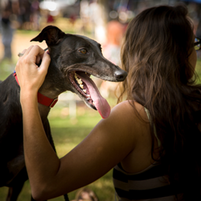
Icky Poop
Greyhound people seem to spend lots of time talking about greyhound poop; with some, the topic seems to border on obsession. One reason this issue is so frequently discussed is that what appears “normal” to some may look “icky” to others. And, when it comes to poop production, not all greyhounds are created equal nor do they necessarily create poop like other breeds. To help you with the delicate issue of poop, we have developed some guidelines about the appearance of greyhound poop. Remember, the first week or so that your greyhound is with you, he’s undergoing huge changes – food, water, location, companionship, “rules” and possibly even living with a cat or a child! Egads! Any of these are enough to derail his delicate digestive system for a few days. If poop does not seem to be improving in consistency and frequency, a good brand to try is Purina One Sensitive Stomach (a salmon, oatmeal and rice food). It is reasonably priced and seems to work well on greyhounds' delicate digestive systems. But remember to introduce the new food gradually over several days and anticipate that changing the food may upset the dog’s system again for a short period of time.If you feel that your dog has a serious case of diarrhea, contact Cathy Kiburtz or Sandy Hightower. And, if at any time, blood appears in the poop or the dog appears to have difficulty or pain when eliminating, contact Cathy and Sandy immediately. If things just look “icky” but you aren’t sure how “icky” they look, here are some guidelines:
For more help, check out an article on this topic that includes photos: The Scoop on Poop. by Sandy Hightower, Greysave volunteer Bloat
Gastric Dilation-Volvulus (Bloat) is a life-threatening abdominal disorder that requires immediate veterinary attention. It's a growing problem for some reason. While or just after eating, the dog's stomach swells from gas or fluid, sometimes causing it to twist. If it's just a mild dilation of the stomach due to gas, it can be treated at home. If the stomach twists, however, the dog is in a life-or-death situation and must be taken to a vet immediately. Large, deep-chested dogs are particularly susceptible to bloat. Signs of acute stomach swelling (but not a twisted stomach):
If your hound is able to belch or vomit, his stomach probably is NOT twisted. Signs that the stomach has twisted are similar to those above but more acute. The dog breathes rapidly, his mouth membranes are cold and pale, and he collapses. These signs are due to strangulation of the blood supply to the stomach. Rush your dog to the vet. Surgery will be necessary to relieve a twisted stomach. The stomach is opened up and the twist is unwound. Sometimes a portion of the stomach or the spleen must be taken out. The vet may staple the stomach in such a way that it is less likely to twist again. In nearly every case of severe bloat, the dog had a history of overeating, eating fermented foods, drinking excessively after eating, or vigorous exercise within 2-3 hours of a meal. Measures that may help to avoid bloat include the following:
“The onset of bloat is usually sudden. Picking up on common early warning signals can mean the difference between life and death...One moment your dog may be pacing or acting somewhat restless, and the next, he’s fighting for his life...” (“As the Stomach Turns,” Southern California Dog Magazine) Some information taken from Delbert G. Carlson and James M, Giffin, Dog Owner's Home Veterinary Handbook, Howell Book House, 1983. |
